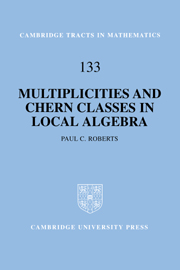Book contents
- Frontmatter
- Contents
- Preface
- Part One Multiplicities
- 1 Prime Ideals and the Chow Group
- 2 Graded Rings and Samuel Multiplicity
- 3 Complexes and Derived Functors
- 4 Homological Properties of Rings and Modules
- 5 Intersection Multiplicities
- 6 The Homological Conjectures
- 7 The Frobenius Map
- Part Two Chern Classes
- Bibliography
- Index
4 - Homological Properties of Rings and Modules
from Part One - Multiplicities
Published online by Cambridge University Press: 29 September 2009
- Frontmatter
- Contents
- Preface
- Part One Multiplicities
- 1 Prime Ideals and the Chow Group
- 2 Graded Rings and Samuel Multiplicity
- 3 Complexes and Derived Functors
- 4 Homological Properties of Rings and Modules
- 5 Intersection Multiplicities
- 6 The Homological Conjectures
- 7 The Frobenius Map
- Part Two Chern Classes
- Bibliography
- Index
Summary
The topics discussed in this chapter, Cohen-Macaulay, Gorenstein, and regular rings and their related properties, were originally introduced by Macaulay, so they predate the introduction of homological algebra by several decades. However, there are now several convenient homological characterizations of these properties. In the first section we discuss the basic definitions of Cohen-Macaulay and Gorenstein rings; much of this material can be found in Matsumura. In later sections we give various alternative homological interpretations. Section 2 is devoted to the concept of dimension that will be used throughout the remainder of the book.
Cohen-Macaulay and Gorenstein Rings
In this section we give the definition of depth and its relation to dimension, as well as standard definitions and basic properties of Cohen-Macaulay and Gorenstein rings.
Let A be a local ring with maximal ideal m, and let M be a nonzero finitely generated A-module. Let k = A/m.
Definition 4.1.1The supremum of integers k such that there exists a regular sequence of length k on M is called the depth of M.
This definition applies in particular to the case in which M = A. The simplest example of a regular sequence is obtained by letting A = k[[x1, … xn]] and taking the sequence x1, … xn.
- Type
- Chapter
- Information
- Multiplicities and Chern Classes in Local Algebra , pp. 64 - 92Publisher: Cambridge University PressPrint publication year: 1998

